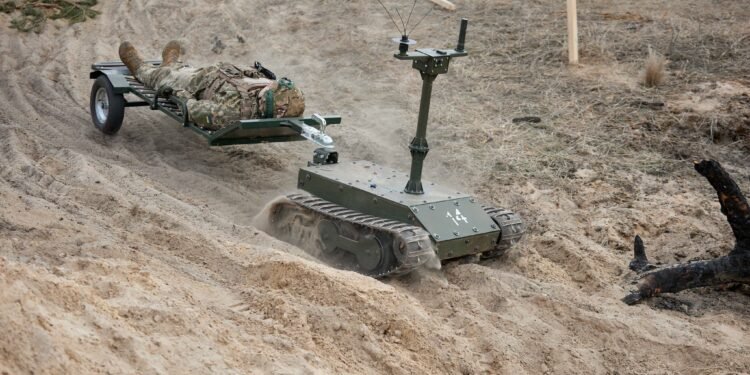The Ukrainian government is expediting the deployment of military robotic platforms to support frontline operations against Russia.
Deputy Commander-in-Chief of the Armed Forces of Ukraine, Andrii Lebedenko, told local newspaper Ekonomichna Pravda that contracts have been signed for unmanned systems that can carry out medical evacuation missions.
These robotic platforms will be crucial on the battlefield as they will help save the lives of defenders without putting anyone else in harm’s way.
“We already have schools that train the military to use ground robotic platforms,” he said. “We understand what characteristics they should have and our doctors are already working with manufacturers.”
“The commander-in-chief’s position is that we should speed up this process.”
Ukraine has started mass production of robots. @Brave1 tested 50+ various ground systems. In a few months, hundreds of them will be procured by @UNITED24 and will fight on the battlefield, saving the lives of 🇺🇦 defenders. pic.twitter.com/QrKWrQU9eg
— Alex Bornyakov (@abornyakov) March 12, 2024
Recent Demonstration
Recently, the Ministry of Strategic Industries conducted demonstration trials of the ground robotic platforms available in Ukraine.
The event aimed to highlight the importance of safe medical evacuation and encourage more firms to enter into direct contracts with Ukrainian manufacturers.
Nine products from seven local manufacturers took part in the demonstration. These products include the Mule and TerMIT unmanned ground vehicles for evacuating the wounded while the operator is at a safe distance.
“Today, robotic systems are the solution that can save the life of a wounded person, shorten the evacuation time, and preserve combat effectiveness of the unit under any conditions,” Medical Service official Ihor Shcherbakov said.
‘Needed at the Front’
Alina Mykhailova, head of the Medical Service of the Da Vinci Wolves Battalion, narrated a situation at the front wherein a group of Ukrainian medics was compromised during a mission.
She said the group was trying to remove a seriously-wounded soldier from the front line when Russian forces struck them.
“Instead of one wounded person, we got five. [And] instead of 30 to 40 minutes, the evacuation lasted for 2.5 hours,” she said.
These situations call for more investments in safer methods such as unmanned medical evacuation, though Strategic Industries deputy minister Anna Hvozdiar admitted that the government only has “very limited resources.”
“Such equipment is needed at the front. It saves the lives of both wounded and military medics. Our manufacturers know how to make really high-quality products. In order for these products to get to the front, they must be procured,” she said.









